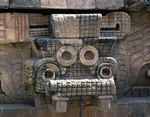There are numerous significant events that stand out from the era of discovery of the Americas. One event in particular is Hernando Cortés and his group of six hundred men conquering the Aztec Empire. One might ask how this conquest was possible? How was a small number of men able to conquer an entire empire? One factor that contributed to the Spanish conquest was the disease smallpox; however, there was another variable as well. The Aztec emperor Montezuma mistakenly believed Cortés to be Quetzalcoatl, an all powerful Aztec god who had promised one day to return to his people.1 So who was this supposed almighty god and why was Cortés believed to be him?

Quetzalcoatl, though most famously known for his relation to the Aztec religion, was actually acknowledged long before the Aztec civilization. Quetzalcoatl’s believers stretched all over Mesoamerica after the fall of Teotihuacan.2 Teotihuacan was a prehistoric city located in Central Mexico. The city arose around the first or second century BCE and fell around the 600s or 700s.3 The information regarding the civilization residing inside of Teotihuacan is still not fully known due to outside elements such as weather and other tribes who may have resided or passed through the area. The exact reason for the destruction of the city is still unknown. Although, archaeologists speculate the downfall was caused by a rapid decline in population.4 In accordance with Aztec legend, Quetzalcoatl had traveled from the east and elevated the Aztec empire by teaching them how to grow crops, develop architectural structures, and create tools with medal. He also helped construct the Aztec calendar. When an unknown rival tribe had surfaced, they drove Quetzalcoatl away. Before he left, Quetzalcoatl promised one day to return and save his oppressed people.5 Quetzalcoatl’s deity is represented as a feathered serpent.6 He was understood to be the god of learning and the patron of priests.7 Quetzalcoatl’s forthcoming was suspected to be around the same time as Cortés’ arrival.8

Scholars have attained an impressive amount of knowledge from ancient Aztec documents. According to their discoveries, the Aztecs proclaimed various omens of warning, which occurred just before the arrival of the conquistadors. Such omens included: an unusual amount of stars and comets in the sky, a sacred temple caught on fire, and the water on the lakes and rivers seeming to boil. All of these signs and the belief in the soon return of their god Quetzalcoatl, made it easy for the Aztecs to presume that Cortés was their long awaited god. Upon Cortés’ arrival, he was greeted with jewels and an assortment of gifts. When Cortés soon realized who the Aztecs deemed him to be and the influence his mistaken identity could produce, he was quick to use this opportunity to gain Montezuma’s trust, knowledge, resources, material objects, and even his fear. With their own emperor in a state of dismay, the rest of the Aztec people arose in a state of hysteria. This made it possible for Cortés and his men to manipulate the Aztecs, and profit from them what they wanted while they could. Eventually, Montezuma’s mistake led to the conquest of his entire empire.9
The Aztecs’ religious beliefs were fundamental attributes to their civilization. It was a unique quality which made them their own empire. In this particular circumstance, it was also a cause for their destruction. The Aztecs wholeheartedly believed their god Quetzalcoatl was partly responsible for the development of their civilization. Many Aztecs also truly believed Cortés was the return of their beloved god. Unfortunately for the Aztecs, their faith contributed to their conquest.
- Sara E. Cohen, “How the Aztecs Praised Montezuma,” Society for History Education 5, no. 3 (March 1972): 24-26. ↵
- Michael E. Smith, “Aztecs,” in The Oxford Handbook of the Archaeology of Ritual and Religion., by Rowan, Yorke M., ed. Timothy Insoll, vol. 77 (Arizona State Unversity, 2011), 563. ↵
- George L. Cowgill, “State and Society at Teotihuacan, Mexico,” Annual Review of Anthropology 26, no. 1 (October 1997): 129-130. ↵
- George L. Cowgill, “State and Society at Teotihuacan, Mexico,” 156. ↵
- Sara E. Cohen, “How the Aztecs Praised Montezuma,” 24-26. ↵
- Michael E. Smith, “Aztec Culture: An Overview” (Arizona State University, 2006), http://www.public.asu.edu/~mesmith9/1-CompleteSet/Smith-AztecCulture-WWW.pdf, 5. ↵
- Michael E. Smith, “Aztecs,” 563. ↵
- Sara E. Cohen, “How the Aztecs Praised Montezuma,” 24-26. ↵
- Sara E. Cohen, “How the Aztecs Praised Montezuma,” 24-26. ↵



65 comments
Christopher Hohman
Nice article. It is really interesting how Cortes used the Aztecs religious beliefs to manipulate them. The Aztecs took him and his solders in and treated them like gods and the conquistadors took complete advantage of them. It is kind of eerie though that the Aztecs had this prophecy that would have fit most Europeans. Montezuma was so blinded by his faith he could not see through the conquistadors charade.
Luisa Ortiz
I’m always fascinated by the Aztec culture and history mainly because of my roots. I like how brief yet descriptive this article is! there are so many articles, books, essays etc; already written about this time period but what I liked about this article is how straight to the point and fresh is. I will like to know the writer’s perspective on Corte’z point of view.
Ysenia Rodriguez
I would like to start by saying thank you for teaching me something new about my culture. My grandmother had Aztec blood running through her veins, and my father has talked a lot about this part of our culture since I was a child- so I knew quite a bit about the rise and fall of this mighty empire. Something I did not know, however, was that Quetzalcoatl had been recognized throughout Mesoamerica before the Aztec religion. Quetzalcoatl has a traveler who was worshiped in other parts of Mesoamerica before coming upon the Aztecs and leading them to the huge, successful society they were. Unfortunately, their belief in their powerful, almighty god forsaken them and allowed for Cortés and his men to easily conquer the men, women, and children who mistook him for their god.
Eric Ortega Rodriguez
Wow, let me start off by saying how interesting this article was. I had never heard of the story of Quetzalcoatl, and I found it very interesting. Furthermore, when learning about the Aztecs and their beliefs, I found it very sad that their beliefs led to lives being lost. I find it intriguing how the timing of Hernando Cortés was perfect to when Quetzalcoatl was supposed to return. Overall, this is a sad yet informative article.
Alexander Manibusan
Indeed, Quetzalcoatl is one of the most influential gods in Mesoamerica. He was also known to the Mayans (known as Kukulkan) and to many other civilizations. Quetzalcoatl was more than a god of learning and the patron of priests though. He was also associated with the sky, the winds, and is occasionally seen as some sort of creator god. It would have been nice if the article went a bit deeper with the mythological background of Quetzalcoatl. Nonetheless, this article did well expressing how this deity was so important to the Aztecs and how it, unfortunately, led to their demise.
Hector Garcia
Overall, the article seemed to well-researched and it was also able to capture the Aztecs and some of the aspects that lead to their demise. What surprised me the most from this article was that the Aztecs thought that Hernando Cortés was Quetzalcoatl. I also thought the story of Quetzalcoatl and how he helped the Aztec people was really interesting.
Constancia Tijerina
Reading this article seemed so refreshing and grateful that my culture is being noticed and all of its rich history and all the great battles to be retold and taught to this date. What makes this article so great is the story behind how the Spanish managed to conquer this strong and great empire. It upsets me due to the facts that the Spanish were so much more technologically advanced compared to the Aztecs who truly stuck to their culture and who were oblivious to the fact of conversion being a thing at all. Over all, this article is truly an interesting piece and an intriguing article for all readers. Great job!
Marlene Lozano
I love the introduction, it really catches the readers eye. I have little knowledge of who Hernan Cortes is, but this article is very informative. I think its awful how Cortes took advantage of the Aztec people because they thought he was supposed to be the god Quetzalcoatl. I loved reading this article because not many people talk about the ancient civilizations.
Marlene Lozano
I have not had much history on the Aztec culture, so this was very informative for me. I have not heard of Quetzalcoatl, so this was a real eye-opener to the history of the Aztecs. It is impressive how these ancient cities developed and functioned back then. Cortes had a significant influence on the Aztec Empire because they believed he was Quetzalcoatl.
Regina De La Parra
I am very glad I read this article because I can connect to it a lot because I am from Mexico and I know the importance of the Aztec people. They had such an incredible living system before the Spanish came along and I think it is very important that we acknowledge that today. But even though the Quetzalcoatl was and continues to be a very powerful image, before this article, I did not know all of the stories behind it. Great job Mia!